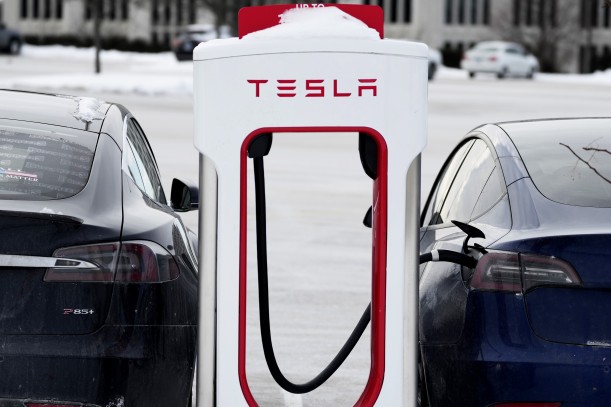Brand Names Sometimes A Bust

Tesla Supercharger stands in Rolling Meadows, Ill., Monday, Jan. 30, 2023. (Nam Y. Huh / AP Photo)
I drive a Tesla. It’s fast and fun … a rocket off the line, a champ on the freeway. I’m shallow enough, too, that I occasionally smile when passing a gas station. When fuel topped $5 a gallon, I may have even laughed aloud once or twice. Other than that phantom braking thing that scares the holy bejesus out of me occasionally, I’m pleased with my Tesla.
Sometimes I’m self-conscious about driving it, however.
That’s because I struggle with Tesla’s track record of poor working conditions and charges of racism at its plants, the latter currently the subject of a $137 million lawsuit. And don’t get me started on owner Elon Musk, the face of Tesla. Ironically, Musk was hardly involved with the actual creation of the world’s best-selling EV compared to the two principals in that endeavor: Mark Tarpenning and Martin Eberhard. Yet, Musk and Tesla, like others, have morphed into a single organism when it comes to today’s corporate brand recognition landscape.
My take on Tesla and its CEO are part of a larger discussion going on about whether we should take into consideration the behavior of businesses with whom we do business.
The investment universe is embroiled in a similar discussion on ESG: environment, social and governance. ESG essentially assigns a social investment “score” based on a series of criteria. From Investopedia: “ESG investing refers to a set of standards for a company’s behavior used by socially conscious investors to screen potential investments.”Environment includes corporate policies on climate change. Social looks at a company’s relationships, be they employees, suppliers, customers or entire communities. Governance covers management and leadership, from pay to shareholder rights.
In December, then–Nebraska Attorney General Doug Peterson weighed in on ESG, publishing his research on the practice and declaring in an abstract of sorts that ESG is “creating and imposing standards on businesses and punishing them if they do not comply. This movement is a threat to our democratic form of government.” Peterson’s view reflects a trend among GOP leaders and lawmakers to put limits on social conscious investing, which they now call “woke capitalism.” (The woefully ill-defined “woke” is now the preferred conservative shorthand for anything bad … a W-bomb if you will … resulting in a clownish insistence on using the word such as woke politics, woke lunch, woke vehicle — a Tesla, surely.)
While money managers and financial cowboys wrestle with ESG, individual consumers can use corporate behavior in buying decisions, too. For the record, I bought the Tesla before I knew much about Musk and its ESG. That’s on me.
Did Henry Ford’s well-documented antisemitism — Hitler kept a picture of Ford on his desk — interfere with Ford Motors’ market share? Did Steve Jobs’ fame and occasional flamboyance drive computer buyers to Android systems? Does the wealth and power of Google mean users bypass it for Bing? Does Jeff Bezos’ influence on society move you to consider relocating to another planet just to get away from Amazon?
Sometimes the CEO is faceless. Earlier this month California Gov. Gavin Newsom announced that the State of California would no longer do business with Walgreens after the pharmaceutical chain said it would not provide the abortion medicine mifepristone in states that warned of legal action if Walgreens proceeded.
Nebraska Gov. Jim Pillen has announced that the state and its contractors will no longer buy communications technology, equipment and services from a handful of Chinese companies the FCC considers security risks. Nebraska State Sen. Julie Slama has proposed legislation that would bar state entities from entering into a contract with any business that is boycotting Israel.
Famed economist Milton Friedman once wrote, “There is one and only one social responsibility of business. To use its resources and engage in activities designed to increase its profits so long as it … engages in open and free competition without deception or fraud.”
Profit, as we know, should be a focus of any business. But I doubt Uncle Miltie would fault me if I’d rather shop elsewhere than buy life insurance from a guy with a hooded sheet and cross burning materials in his garage. Or frequent a restaurant whose owner refuses to hire transgendered workers. Or rent the Airbnb from the family flying a swastika on its Facebook page.
Call it woke but — however trite — character counts, even and especially in the marketplace. And why sometimes I wince when plugging in my car.
This story was originally published by Nebraska Examiner, an editorially independent newsroom providing a hard-hitting, daily flow of news. It is part of the national nonprofit States Newsroom. Find more at nebraskaexaminer.com.
Category:
User login
Omaha Daily Record
The Daily Record
222 South 72nd Street, Suite 302
Omaha, Nebraska
68114
United States
Tele (402) 345-1303
Fax (402) 345-2351




